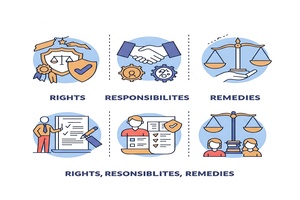Contractual Obligations: Rights, Responsibilities, and Remedies

Unraveling the Threads of Contractual Agreements
Ever signed a contract and felt lost in a sea of legal jargon? Contracts are the bedrock of nearly every transaction, yet understanding your precise rights, responsibilities, and the recourse available if things go awry can feel like navigating a complex maze. You're not alone in this; many professionals grapple with deciphering these critical documents. For those seeking clarity and confidence, leveraging specialized tools can make all the difference.
This guide will serve as your compass through the landscape of contractual obligations. We'll dissect the essential components of a valid contract, illuminate the duties and entitlements it establishes, and examine the remedies available when agreements falter. Whether you're a seasoned executive, an emerging professional, or simply an informed individual, this post will equip you to engage with contracts more effectively.
We'll delve into the core elements that make a contract enforceable, distinguish between explicit and implicit terms, and outline common breaches. Furthermore, we'll explore the array of remedies at your disposal, from financial damages to equitable solutions. By the end, you'll possess a foundational understanding to manage your contractual duties, mitigate risks, and safeguard your interests. If you're looking for an expert perspective to ensure you haven't missed anything, consider using Roast My Contract to get an AI-powered review.
The Duality of Contractual Rights and Responsibilities
At the heart of every contract lies a fundamental balance: rights and responsibilities. A right is an entitlement a party possesses under the agreement – perhaps the right to receive payment, goods, or services. Conversely, a responsibility (or obligation) is a duty a party must fulfill – delivering goods, providing services, or adhering to specific terms. This reciprocal relationship is the essence of contractual law.
Consider a simple contract for the sale of goods. The seller has the right to receive payment and the responsibility to deliver the goods as agreed. The buyer holds the right to receive the goods in the promised condition and the responsibility to pay the agreed price. Ensuring these are clearly articulated is vital for a smooth contractual journey.
Ambiguity is the enemy of clarity. Vague language can sow the seeds of disputes and potential breaches. For instance, precisely defining the quantity, quality, and delivery schedule of goods minimizes room for misinterpretation. Similarly, clearly outlining the scope of services and performance metrics can prevent future disagreements. The more unambiguous the contract, the smoother the relationship will be. For a thorough check on your contract's clarity, leveraging a service like Roast My Contract can provide valuable insights.
Understanding your rights and responsibilities empowers proactive management. Knowing your duties allows for effective resource allocation and reduces the risk of non-performance. Awareness of your entitlements enables you to protect them should the other party falter. This foresight saves time, money, and potential legal entanglements, fostering a more confident contractual engagement.
Pillars of Enforceable Contracts
Not all agreements are legally binding. For a contract to be enforceable, it generally requires several key elements:
- Offer and Acceptance: A clear proposal met with an unequivocal agreement.
- Consideration: A valuable exchange between parties (money, goods, services, or a promise).
- Capacity: Parties must possess the legal ability to contract (sound mind, legal age).
- Legality: The contract's purpose must be lawful and not against public policy.
- Intention to Create Legal Relations: Parties must intend their agreement to be legally binding.
(Source: Cornell Law School, Legal Information Institute). Ensuring these pillars are firmly in place is crucial for your agreement's validity.
When Obligations Go Unmet: Breach of Contract
A breach of contract occurs when a party fails to fulfill their agreed-upon obligations. This can range from delayed deliveries and substandard services to missed payments. The consequences can be severe, leading to financial losses, reputational damage, and legal battles. Contract disputes are a significant driver of business litigation, underscoring the need for robust, well-understood agreements.
Common types of breaches include:
- Material Breach: A significant violation that defeats the contract's core purpose.
- Minor Breach: A less substantial violation that doesn't fundamentally undermine the agreement.
- Anticipatory Breach: A party signaling in advance their inability or unwillingness to perform.
Seeking Resolution: Remedies for Breach
When a breach occurs, the non-breaching party typically has several avenues for recourse. The appropriate remedy often depends on the breach's nature and the contract's specific terms:
- Damages: Monetary compensation to cover losses incurred due to the breach. This can include direct, consequential, and sometimes punitive damages.
- Specific Performance: A court order compelling the breaching party to fulfill their contractual duties, typically used when monetary damages are inadequate (e.g., for unique assets).
- Rescission: Cancellation of the contract, aiming to restore both parties to their pre-contractual positions.
- Reformation: Modification of the contract to correct errors or reflect the parties' true intentions.
Navigating these remedies can be intricate, highlighting the value of a clear, well-defined contract from the outset. For a comprehensive review that can help prevent the need for these remedies, consider using Roast My Contract.
Mastering Your Contractual Landscape
In essence, mastering your contractual obligations is vital in today's intricate business environment. We've explored the foundational elements of contracts, the critical importance of clearly defined rights and responsibilities, and the spectrum of remedies available when breaches occur. Proactive measures, such as ensuring your contracts are meticulously drafted and reviewed, are your best defense.
A well-drafted contract is more than just a document; it's a blueprint for a successful relationship. By investing time in defining expectations and understanding potential pitfalls, you significantly reduce the likelihood of disputes and protect your interests. Remember, prevention is far more effective than cure. Tools are available to assist you in this crucial endeavor.
Ultimately, contracts are the architecture of trust and collaboration. By adopting an informed and proactive approach to your contractual obligations, you build stronger, more reliable relationships and confidently pursue your objectives.